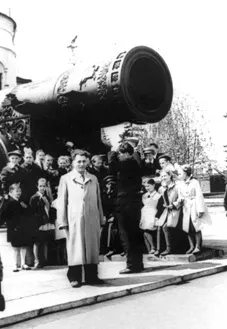I, Rahmil Shmushkevich, in Moscow in 1957 after a meeting with the Vorkuta camp inmates near the Kremlin.
This happened on 10 May 1949. On this day I was arrested at night in the street. I had written an article about achievements in labor of the Soviet working people for the "Stalinskoye plemia" newspaper. I submitted it to the office and was walking back home. A car stopped near me and a group of KGB guys encircled me. They showed me their IDs in the car. I was sentenced to 25 years for espionage in favor of the American and German intelligence forces. Their main evidence was a photograph of 1945 from the French communist newspaper "L'Humanite" where I was photographed standing beside de Gaulle's wife. Many Jewish writers and activists of culture were arrested at that period. My investigation officer said to me smiling that I was lucky to have been accused of espionage and that thins could have been much worse if I had been accused of Zionism like many other people. They interrogated me for 170 nights. I signed under all their idiotic accusations or otherwise I would have been destroyed in that prison.
I had my left hand and my left leg paralyzed because of the tortures, and I could hardly move when I reached the camp. I traveled to the camp in a "Stolypinsky" railcar (Editor's note: special railcars for prisoners in Russia since 1906) and at the destination point they carried me from the railcar on a stretcher. I was at the Vorkuta Camp, in the Far North in about 4000 km from Kiev.
Stalin died on 5 March 1953 and we had a feeling of concern and hope. We knew that our life was going to change but we didn't know in what direction. Our warders were furious. I remember one of them, a red hair man cursing that if we dared to say a rude word about Stalin's death he would shoot us. So we kept silent, but we could hardly help smiling. We were political prisoners and in 2-3 years we began to get released.
My family waited for me. I returned in 1956. My daughter Julia was in the 3rd form already. She didn't know where her father had been. If they found out at school she would have been treated with suspicion. My wife Ida was a nurse in the polyclinic and my mother and sister were living in my old apartment.
Once I met by chance a prominent Ukrainian poet and a very honest and decent man Maxim Rylskiy . He helped me a lot. He advised me to stay at home and write. He said I had a great experience and witnessed so many events. I wrote books for children and adults: "Two Gavroshes", "Zhenia at one time", "A Parisian woman" and "A night in the churchyard". I also wrote novels about Germany: "The Sun doesn't fade", "A warm autumn" and "Geology of Conscience". I wrote in the only possible at that time style of writing: socialist realism. I wrote my works to glorify the Soviet reality, Communist Party and raise our children in the spirit of Soviet patriotism. I wrote in Ukrainian. There were only Ukrainian and Russian characters in my books. Jewish characters were not appreciated at that time. My books were published.
I never wrote about the GULAG. I still believed in the idea of communism. I thought that everything bad was Stalin's fault. Maxim Rylskiy promoted publication of my books. He also advised me to work with big commandants of the Soviet army and heroes of the war developing their memoirs into books. Memoirs were very popular in the 1950-60s. This work was paid well and I wrote memoirs for two generals of the Great Patriotic War. They were published and the authors were generals, of course. My name was not mentioned.
I borrowed some money from Rylskiy and in 1962 we bought a two-room apartment. My wife Ida continued working. She was a very reserved, nice and kind woman. She understood me very well and we had a very warm and close family. In 1965 I became a member of the Soviet writers' Union. I could rest and write in the so-called Creativity homes for writers and travel around the country being paid for such trips. I also conducted meetings with my readers. Our life was improving.











